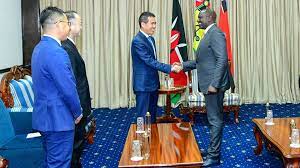Ukraine Zelensky makes first war phone call with Chinese Xi

Ukraine’s Volodymyr Zelensky said he had a “long and meaningful” phone call with China’s Xi Jinping for the first time since the war with Russia began.
He tweeted that he thought the phone call, along with the appointment of an ambassador to Beijing, would “give a powerful boost to the relationship between the two countries.”
China has “always been on the side of the world,” Unlike the West, Beijing has tried to remain neutral about Russian aggression. But has never hidden its close ties to Moscow or condemned the aggression, and last month President Xi Jinping paid Russia a two-day state visit.
He referred to President Vladimir Putin as his “dear friend”, proposed a vague 12-point peace plan and insisted that China stood on the right side of history. However, he made no commitment to providing Russia with weapons. Within days of the visit,
President Zelensky invited the Chinese leader to visit Kyiv for talks, noting they had contact before the full-scale war but nothing since it began in February 2022. In a readout of Wednesday’s phone call, China quoted President Xi as saying that China, “as a responsible majority country”, would “neither watch the fire from the other side, nor add fuel to the fire, let alone take advantage of the crisis to profit”. That statement appeared to be a swipe at China’s biggest international rival, the US, which has provided the most help towards Ukraine’s response to the Russian war.
White House spokesman John Kirby welcomed the phone call as “a good thing” but said it was too early to know whether it would lead to “some sort of meaningful peace movement, or plan or proposal”. The likelihood of China helping to end the war appears remote, not just because Russia has shown no readiness to withdraw its forces from Ukraine’s sovereign territory.
It is a key demand from Kyiv that President Zelensky reiterated: “There can be no peace at the expense of territorial compromises.” Critics have also questioned the idea of Beijing acting as a mediator, citing not only Mr Xi’s firm friendship with Russia’s leader but also China’s soaring trade with Russia and its refusal even to speak of an “invasion”.
Russian foreign ministry spokeswoman Maria Zakharova said Moscow saw “broad concord” with China’s approach but said the main barrier was Kyiv’s “unrealistic demands”. Moscow’s own demands include recognition of its annexation of swathes of Ukrainian territory, including Crimea, which was invaded in 2014.
China’s 12-point plan to end the war has been widely criticized by Ukraine and the West. It does not offer clear plans for the future security of Ukraine or Russian-occupied territories and includes a proposal to lift sanctions unilaterally. Still,
Wednesday’s one-hour call wasn’t a complete surprise. Earlier this month, European Commission president Ursula von der Leyen said President Xi Jinping had said he was willing to talk with the Ukrainian leader “when the circumstances and the timing are right”. She visited Beijing with French President Emmanuel Macron.
President Zelensky has repeatedly reached out to the Chinese president, an acknowledgement that China’s vast wealth and global influence could swing the outcome of the war. In its readout of the call, Beijing announced its willingness to engage directly with Ukraine, by sending a special representative on Eurasian affairs to Kyiv and other capitals for “in-depth communication” on a political settlement.
For his part, Mr Zelensky appointed a former minister, Pavlo Ryabikin, as ambassador to Beijing. Xi Jinping has had recent diplomatic success by persuading Iran and Saudi Arabia to restore ties. While it is possible he may have developed a taste for the role of a key international stakeholder, there may also be an economic element to his intervention.
China’s sluggish economy remains weak after years of stringent Covid-19 restrictions. It relies on export trade and cannot fully recover as the war in Ukraine continues. News of the call made headlines in the tightly controlled Chinese state media, which published a Chinese interpretation of the call. On Chinese social media sites, users expressed their support, with many calling for peaceful dialogue and supporting China acting like a responsible state. “China must break the stalemate and melt the ice!”




